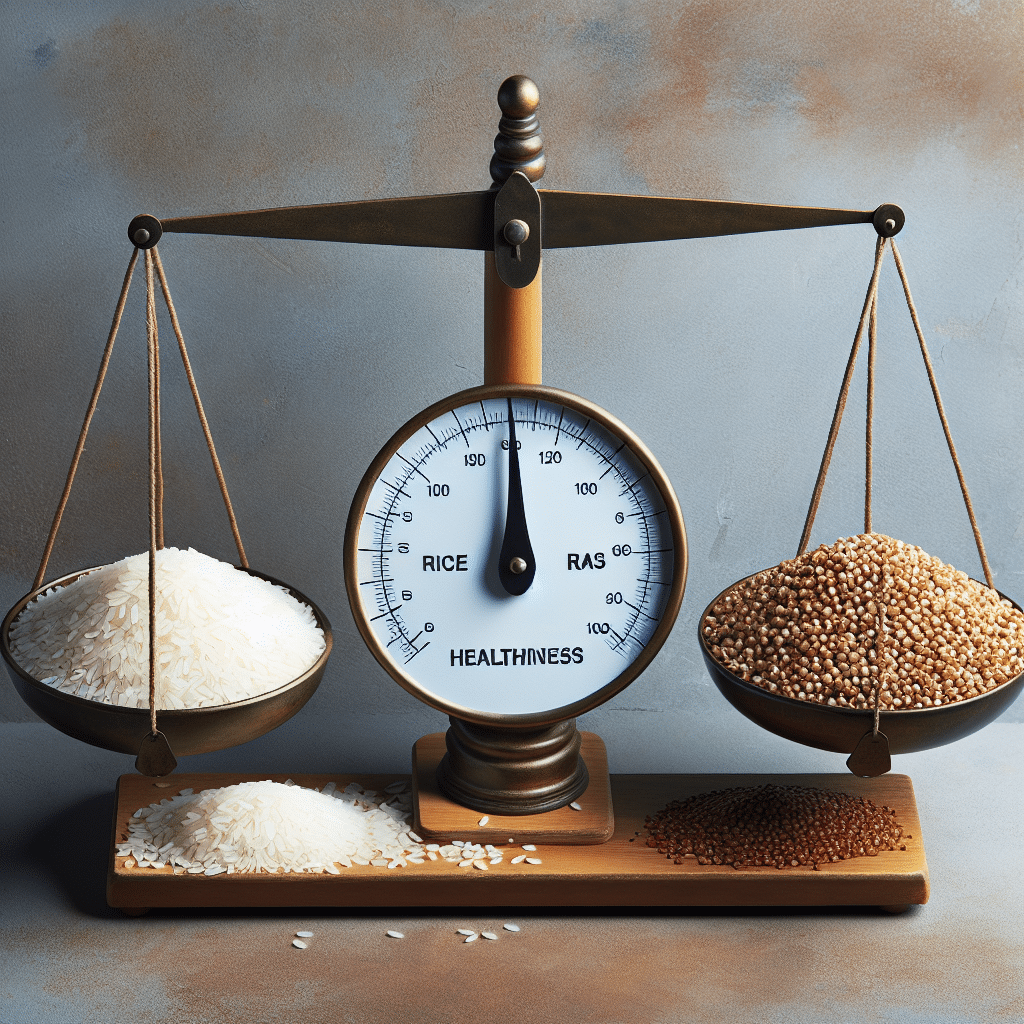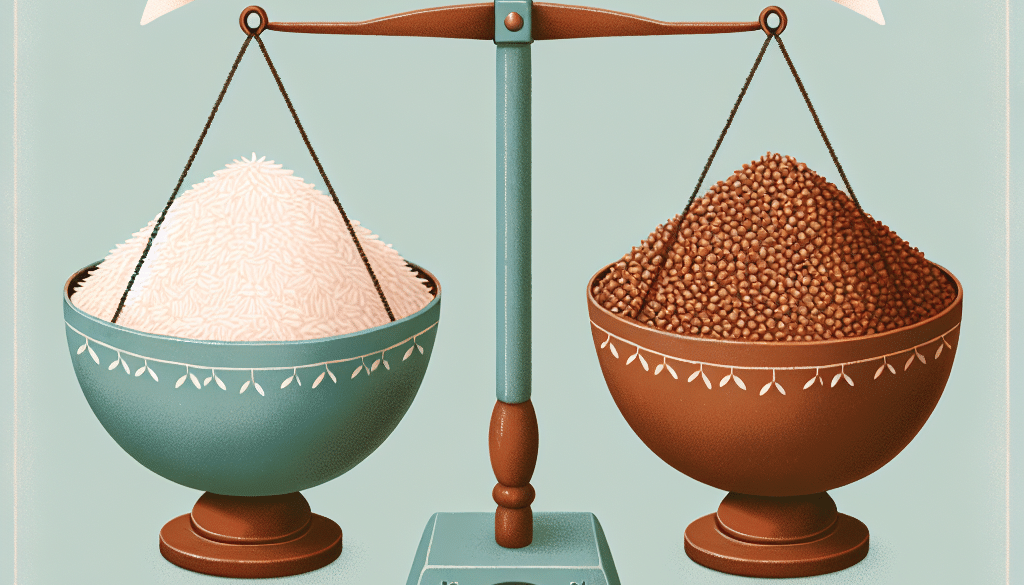What Is Healthier Rice Or Buckwheat?
-
Table of Contents
Healthier Choices: Rice vs. Buckwheat Comparison

When it comes to choosing healthy grains for our diet, rice and buckwheat stand out as popular options. Both have been staples in various cultures for centuries and come with their own set of health benefits. However, consumers often find themselves at a crossroads when deciding which is the healthier choice. This article delves into the nutritional profiles, health benefits, and potential drawbacks of rice and buckwheat to help you make an informed decision.
Nutritional Profiles of Rice and Buckwheat
Understanding the nutritional content of rice and buckwheat is crucial in determining which is healthier. Here’s a breakdown of their key nutritional components:
- Calories: Both grains are similar in their calorie content, with buckwheat having a slightly higher calorie count per serving.
- Carbohydrates: Rice and buckwheat are both high in carbohydrates, but buckwheat contains more fiber, which is beneficial for digestive health.
- Proteins: Buckwheat has a higher protein content compared to rice, making it a better option for those looking to increase their protein intake.
- Fats: Both grains contain minimal fat, but buckwheat has slightly more, including heart-healthy unsaturated fats.
- Vitamins and Minerals: Buckwheat is richer in vitamins and minerals such as magnesium, manganese, and B vitamins than rice.
Health Benefits of Rice
Rice, particularly brown rice, is known for its health benefits, which include:
- Being a good source of energy due to its high carbohydrate content.
- Providing essential minerals like manganese, which is important for bone development and metabolic functions.
- Containing antioxidants that help combat oxidative stress.
- Being easily digestible, making it a suitable option for those with sensitive stomachs.
Health Benefits of Buckwheat
Buckwheat, despite its name, is not a type of wheat but a seed related to rhubarb and sorrel. It boasts several health benefits:
- High in dietary fiber, which aids in digestion and can help manage weight.
- Rich in protein, including all essential amino acids, making it a complete protein source.
- Contains rutin, a bioflavonoid that helps improve circulation and prevents blood clots.
- Gluten-free, making it a great alternative for those with celiac disease or gluten intolerance.
Potential Drawbacks
While both grains have their advantages, they also come with potential drawbacks that should be considered:
- Rice: White rice is high in carbohydrates and low in fiber, which can lead to blood sugar spikes. It may also contain traces of arsenic, a toxic substance found in soil and water.
- Buckwheat: Buckwheat contains oxalates, which can contribute to kidney stone formation in susceptible individuals.
Which Is Healthier?
When comparing rice and buckwheat, it’s clear that buckwheat generally offers more nutritional benefits. It is higher in protein, fiber, and essential nutrients, which contribute to overall health. However, the choice between rice and buckwheat should also consider personal dietary needs, taste preferences, and any specific health concerns.
Conclusion
In conclusion, both rice and buckwheat have their place in a balanced diet. Buckwheat tends to be the healthier option due to its higher protein and fiber content, as well as its rich supply of vitamins and minerals. Nonetheless, brown rice remains a nutritious choice, especially for those who require a gluten-free diet or have digestive sensitivities. Ultimately, variety is key in a healthy diet, and incorporating both grains can provide a wide range of nutrients and health benefits.
Enhance Your Diet with ETprotein’s Protein Products
If you’re looking to boost your protein intake with high-quality, plant-based options, consider ETprotein’s range of protein products. Their organic rice protein and other plant-based proteins are an excellent addition to any diet, providing the essential amino acids your body needs. Whether you’re a fitness enthusiast, following a vegan lifestyle, or simply seeking to improve your overall health, ETprotein’s products are designed to support your goals.
About ETprotein:
ETprotein, a reputable protein and L-(+)-Ergothioneine (EGT) Chinese factory manufacturer and supplier, is renowned for producing, stocking, exporting, and delivering the highest quality organic bulk vegan proteins and L-(+)-Ergothioneine. They include Organic rice protein, clear rice protein, pea protein, clear pea protein, watermelon seed protein, pumpkin seed protein, sunflower seed protein, mung bean protein, peanut protein, and L-(+)-Ergothioneine EGT Pharmaceutical grade, L-(+)-Ergothioneine EGT food grade, L-(+)-Ergothioneine EGT cosmetic grade, L-(+)-Ergothioneine EGT reference grade and L-(+)-Ergothioneine EGT standard. Their offerings, characterized by a neutral taste, non-GMO, allergen-free attributes, with L-(+)-Ergothioneine purity over 98%, 99%, cater to a diverse range of industries. They serve nutraceutical, pharmaceutical, cosmeceutical, veterinary, as well as food and beverage finished product distributors, traders, and manufacturers across Europe, USA, Canada, Australia, Thailand, Japan, Korea, Brazil, and Chile, among others.
ETprotein specialization includes exporting and delivering tailor-made protein powder and finished nutritional supplements. Their extensive product range covers sectors like Food and Beverage, Sports Nutrition, Weight Management, Dietary Supplements, Health and Wellness Products, and Infant Formula, ensuring comprehensive solutions to meet all your protein needs.
As a trusted company by leading global food and beverage brands and Fortune 500 companies, ETprotein reinforces China’s reputation in the global arena. For more information or to sample their products, please contact them and email sales(at)ETprotein.com today.














